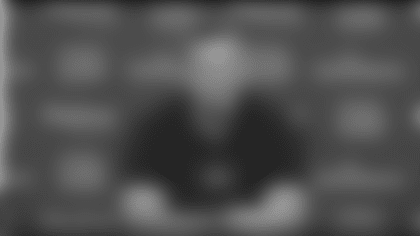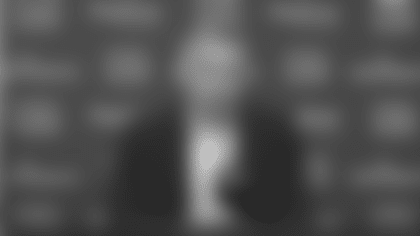Head coach MARVIN LEWIS and Director of Football Operations JIM LIPPINCOTT (Retiring)
Initial comments:
ML: "I want to thank you. It has been a great three days, and without a seventh round pick, we are concluding with the draft part. Right now, they are upstairs meeting and trying to get our bearings for once the seventh round is over and the compensatory picks are gone, so we can begin to sign free agent players. I asked Jim Lippincott to be here at this press conference today because this was one of his final acts as an employee of the Bengals. In my 10 drafts here now, I just wanted to thank Jim and sing his praises publicly for all that he has done. The life of an area scout isn't glamorous all the time. The fact that Jim did it while living here in Cincinnati, meeting us on the road for every game, being in the coaches booth helping me and everything else he did, I just wanted to thank him publicly for that. I wanted to let everyone know how valuable he was in signing players, working with the free agents, bringing guys in for workouts and rookie camps, filling out our rosters by position, hosting our local free agent days, inviting the non-combine guys, ranking the prospects and everything else he did.
"He did a lot of things that go unnoticed, and he did an outstanding job with it all. This was his last one. I can remember back in November or early December, whenever Mike (Brown) told me Jim was thinking about retiring. I went to Jim and asked him to stay on until the draft, and he was so gracious in doing that and assisting us with that. He had been in his area and written the reports and so forth, and it was very important for us because they have been at the school and seen the player practice. They see much more than we can see on tape. They had great relationships and rapport with the guys in the area, and I'm glad he was gracious enough to divide his time with his new future and us. It has been great to have him here. I'm going to see if Jim has anything to say and then open it up for questions."
JL: "There is no question that the last 21 years and the last 21 drafts have been a labor of love. I have to admit that when I was being raised by my family and going through school, I never thought of being a scout until Mike (Brown) presented me with the opportunity back in 1992. I thought I would come and stay for a year or two and see if I liked it, and if I didn't, I could always go back to high school coaching. Then I stayed 20 years because I fell in love with the place, and I still am. The toughest thing about walking out the door will be the relationships that have been established. I hope as I go back and reinvent my coaching career that I can be half the football coach that Marvin (Lewis) is. Even more important than that is being the kind of person that he is because he treats people the right way, just like he is doing here with me now. Not many people would bring guys like me in here and say the nice things that he did and I deeply appreciate it. I have expressed over and over my love for (Bengals president) Mike (Brown), and I think all of you know how close I am to Mike. I will always be grateful for him. I intend to come back down here for practices and to listen to our coaches again because I have learned so much from the people here now and the people that preceded them, and I want to continue to do that. I dearly love the Bengals and I always will. What I am about to do is something that I felt I had to do at this stage in my life for a variety of reasons. I look forward to that as much as I have enjoyed being a Bengal and doing what I was doing here. And I thank all of you too."
What were your feelings like when you walked into the building today, knowing this was the last day of the draft?
JL: "It was hard, and I thought about it. It's hard right now. However I do have the opportunity to come back and that is important. I have the opportunity to come back and watch the practices and be around some. It was hard though. This has been a big part of my life. I tried to make it a normal work day and I even came in extra early so I could make it a normal work day because I do get here early. It was difficult today."
What is your most fond memory?
JL: "There's too many to choose from. I was thinking about that driving down today, and I remember the old slate blackboards we had in the old draft room. I would get up there and put my chicken scratch on it like we do now. (Former equipment manager) Tom Gray would come in at night, he had impeccable handwriting, and he'd take his colored chalk and put all of our rounds up there. Our security was just a canvas that you pulled down like a venetian blind that covered it up. I thought about that and the first draft that we went through and all of that. There have been so many draft-wise that it would be hard to remember all of them. I remember the cardboard cutout we had of Dan (Wilkinson) at (a pre-draft dinner). There is just too many to remember. I will say that when Marvin (Lewis) got here, the draft meetings improved. Everything we do now, we did in a week's time. When we went in and did the draft readings in 1992 and the mock drafts and such, we did it all in one day. By the end of the day, everyone was so tired they couldn't think. When Marvin got here, we divided the day up so coaches could work on football as well and everyone had a fresher mind. We started earlier and the way we do it now is much better than the way we did it back then."
Initial comments on the 2012 draft:
ML: "Let me sum up the day. Obviously with Dan (Herron) in the sixth round, we get a guy who had a productive career at Ohio State. They have a lot of good players up there, and he has done a lot of good things running the football. We are really excited to add him to our stable of guys and we are ready to get him in here to compete with our guys. He has a chance to make the team by being a runner, playing on special teams, a receiver, and so forth.
"It has been a big three days for us. We have gotten ourselves younger, more athletic, bigger, and stronger. We feel good about the upside of all of these guys that we have been able to add to our team over the last three days. They are young, hungry, and they will do well along with our other young players and veterans who have done a great job of helping lead this team. The guys have come and they know how to work, prepare, and we are excited about that. These guys will be traveling back to Cincinnati on May 10th and we will have our rookie camp the 11th, 12th and 13th. They will be able to stay here and we can go right into our offseason program with the rest of our players. We will be in the third week of the phase two offseason program. After one week of that we will move into phase three which is our OTA phase. It has been a good offseason for us and things continue to move forward and move up, so we just have to keep pointing ahead."
You've had a lot of success over the past few years in the college free agent market. What do you attribute that to?
ML: "That's probably a good question for Jim to talk a little bit about. I'll just mention that the guys that are in their areas have guys that maybe weren't invited to the scouting combine and they are players that we feel have draftable grades. The area scouts, along with the position coaches will work through that process once the compensatory picks are finished. Maybe Jim can offer a little more from his perspective."
JL: "I think one of the misconceptions about scouting is that we get tied up at the top of the draft, but the real secret to scouting is the mid rounds and the late rounds and after you get finished, then lining those people up. The way that it has worked for us is that the area scouts have ideas in their reports about who would be good college free agents. Then we introduce those guys to the position coaches because it's very important that the position coach approve of that college free agent. No matter how hard a scout tries to identify the right guy for our team, the coaches are the ones that know exactly what fits and works for our defensive scheme and our offensive scheme. They have to fit to. There also has to be a height, weight and speed ratio that makes fit as well. So, when the coach and the area coach — like with what's going on up there right now — they could even be reviewing tape right now just to make sure that they have their ducks in a row about who the right guy is going to be. Then when the process starts the scout will call the agent when it's time — we're still going through the draft now, but when the draft is over the scout will call the agent and begin to negotiate the contract and the position coach will call the player and then we become just like college coaches because we're recruiting.
"We are selling the merits of being a Bengal. One of those merits could be roster spots. Maybe we didn't draft a guy in a certain position and that may make that player more attracted to us. So, when we are trying to hammer out the contract, we're also working on the player. We try to emphasize to the player that the agent works for the player, not vice versa. The player and the family have to make a decision as well with what's the best situation, not whether the signing bonus is 10 cents or 15 cents. It's what's the best opportunity for the long haul for you to be able to stick in the National Football league as a player. As Marvin has told our team every year many, many times — and it's so true — it doesn't make any difference how a young man gets here, it's that he got here. That opportunity is more important than what a signing bonus might be. That's kind of the process that we go through and that's what's going on upstairs right now."
ML: "The other thing is that I think the agents have a good feeling about the fact that we have had guys that have had the opportunity and they have made it. Last year, one of the guys that Jim identified early was Colin Cochart, our tight end, who made the football team, who came that way. We've had a number of guys like that, but he would be one that came the route of college free agency. Matt O'Donnell (is another guy). These guys get identified early on, and I think the agents know that we have a track record of giving these guys opportunities, and we are non-discriminating about how they got here. If you're the best guy, then you earn a spot. That spot may be at the end of the roster; that spot may be on the practice squad. There is a proven record of that. We have 16 guys that are college free agents that are coming into the NFL on our team. So, it's right on the number. It's about 20% of the National Football League. We're right on that number, and those guys end up being the nuts and bolts of your football team, because they appreciate every day how they got here."
BenJarvus Green-Ellis is one of those guys:
ML: "(Also) Arian Foster. We know the guys that are there, and they are all not drafted or passed over for different reasons. But again, you have to make the most of it. Once we line them all up in that room, it doesn't matter how they got there. I think that we are going to have great competition at our positions with the guys that we added today, and we'll supplement that with the college free agent players."
Do you think that this is going to be the toughest roster to cut that you've had?
ML: "You've probably asked me that every year. I think it's going to be great competition, and that's what you want. That's what this is. It's play-for-pay, not pay-for-play."
This is your 10th year. Can you think of one year where there was a better roster?
ML: "We've got a lot of guys and that's good. Jim and I were walking down here and he said, 'You won't have guys lingering with injuries, will you?' We've got that kind of mindset of our football team. That's how you win. We have a lot of work to do. We have a lot of ground to make up and cover in order to compete with the other teams in our division. Every team in our division got better over the last three days. You have to love what all the other teams in the division have done as well. Now we have to go coach them and go compete."
One area that you weren't able to address in the draft that you may be able to target in free agency is linebacker:
ML: "Yes. That will obviously be a focus in college free agency right now. We'll see pretty soon after the draft. I will tell you that we have guys calling us. People recognize that opportunity because we did not pick a linebacker. Right now our numbers are down there, and we'll add to it in that way."
Was the reason for not picking a linebacker in the draft due to it not being a strong class?
ML: "There were some smaller guys. And they weren't necessarily the guys that Zim (Mike Zimmer) and I felt fit. For what we feel like we need to help our defense, it wasn't as deep of a group."
The last few drafts have been very productive. I've heard from the so-called experts say that this is one of the best. Do you feel like things are in place?
ML: "Jim mentions what I did, but I didn't make changes. Mike (Brown) and I talk about what's the best way to do things. I think the fact is that the way that we've done it provides input from everybody. I think that the area scouts have done a great job crosschecking, which to me is key. That's another set of eyes on a grouping of players. Just like the coordinators, just like the position coach — as well as Duke Tobin, who has been in charge of it.
"Now when you have another set of eyes that can give you a firm report, like 'This is how I compare them, boom, boom, boom.' To me, that makes a big difference. It enables Mike and the end of the day to make a good decision. I think that we've done a nice job of ordering the board, not down, but sideways as we go. We began early this year, and I think we took our time, and I think we had a lot of good discussions. I talk to you guys a lot in here about if these three or four players are left, we feel like this is the order for us and this is why. Then everybody has the opportunity to say their peace. There doesn't have to be lobbying or anything, but (guys say) 'This is why I feel why I do,' and then Mike will ask the position coach, and get input from (coordinators) Jay Gruden and Mike Zimmer, and go from there. Like Jim said, its important that the player fits what we do. It really is important that they fit what we do, and I think our personnel guys have done a nice job of listening and understanding as the coaches are repeating what our guys should be able to do."
When you talk about the board widening, what do you mean by that?
ML: "The fact that we are comparing an offensive guard to a safety, or a running back versus a safety. I think it takes a broad look at that to do that. It takes the guys that have crosschecked and have seen all of those groupings to say, 'This running back that I have looked at in my area is not as good as that defensive end that's there.' I think that's important for people to speak up and say that. Obviously, Mike Zimmer, he's not seeing what that guard looks like, and he can say, 'Mike, I prefer to have these guys on defense.' And Jay can say, 'Well, I prefer to have these guys on offense.' But it takes the scouting group, the personnel people, to say, 'This is how we rank them offense to defense.' "
Was there any discussion about trying to move up in the draft at any point?
ML: "We talked quite a bit about it on Friday morning, and Mike decided not to make that move. We picked three guys on Friday that are really going to help us. We talked about moving up in the third round a little bit, but we didn't consider it all that much before that. We just felt like where we were sitting, we would gain value. I think it was brought up the other day, the fifth-round guys add a lot of value to this football team. If we do as good this year as we have in the past, then those guys will be around here for a while."
Your last two drafts were deemed a success by most accounts, and now this draft is already drawing very positive reviews. Is there a reason behind that? Is there more of a common philosophy?
ML: "You have to philosophically be on the same page. Mike has come in as the coordinator on defense, and he has brought a clear direction of what he feels works. He is very diligent at watching the tape. He and I can have great conversation because he has gone and spent the time watching the tape. I think that's important. Jay, in his year now, has been a very diligent tape watcher. Then, they go in together — the offensive staff and defensive staff — and try and rank the guys offensively and defensively. I think that's an important process. It's one that gets everyone to see everything — the running backs coach sees the offensive linemen, the tight ends coach sees the receivers. So everybody on each side of the ball has a good feel for who the guys are, and why."
Is that a different philosophy from what was done before?
ML: "It was done, but I think those guys are doing a nice job of it. That's the way I want to do it. That's the way I was taught to do it. I think we've done a nice job of it, but we just have to keep doing it. We feel like we know what works. Obviously we've all worked together — with the personnel people — for awhile now. This is the 10th draft for me. Bill Tobin joined us then. Then Duke (Tobin). Greg Seamon. Jim. Now, adding the two guys (scouts Robert Livingston and Steven Radicevic) this year. Pete Brown. Paul Brown Jr. John Cooper. All the people who go out and spend the time and have the input into the players. We've all been together. I think everybody's comfortable with each other, and it works."
The draft picks over the last three years have remained relatively healthy, compared to the 2005, '06 and '07 draftees whose injuries really hampered them. That has to be encouraging and part of the success, right?
ML: "That's the thing. That's the unfortunate part of the draft, when you lose guys to injury that you draft in the first three rounds. Then in the case of Odell (Thurman), the way we lost him. That hurts you. That puts a hole in it. Chris Perry breaks his ankle. Kenny Irons tears his knee up, then chooses to go elsewhere for rehab and doesn't follow their protocol. So that's hurtful. David Pollack's injury. So there's a lot there, and it takes a chunk out of you. The only way to make that up is to go out and sign free agents. You have to go in the UFA (undrafted free agent) market to make that up, because those are big holes to fill, particularly when they're first-, second-, third-round picks."
So you try and find your balance and get your health:
ML: "The other thing is that you want to try and maintain who your good, young players are that you've drafted. Get them extended. We extended some guys back in 2006, and they got hurt — the two offensive tackles. So that hurts you a little bit. You need to be lucky along the way, too. Hopefully we're turning the corner on that and heading up the other side for some good stuff."
When the coaches work with the scouts and player personnel to set the board, has it almost been closer together now, in terms of agreement and people being on the same page?
ML: "I think Jim would say there's going to be some separation (laughs). That's natural. I said that a week ago. It depends; there's always going to be some outliers on both sides, positives and negatives."
JL: "People have good days and bad days. When you're a scout and you're on the road, there are some days where you go to a school and you just fall in love, but then you see the guy later on and realize you're not right and you lower his grade. Grades change. Baskin-Robbins has 31 flavors of ice cream for a reason. That's why it's really important that a scout buys into a coaching staff's views on what they need. I don't think that there's too many players in any one draft where a scout may have a grade over there and a coach may have a grade over there. (Offensive line coach) Paul Alexander and I used to disagree on one guy a year. I don't know why it happened, but it was always one guy. But it was never very far off. It's just that people have different opinions and different things that they value. That's where the difference in opinion comes. The bottom line is what fits for the coaches, and what fits best for the football team."
ML: "A couple years ago, we were discussing a defensive player, and it was with Jim. I said, 'Jim, come on, let's go down and watch this player.' So we go in the room, we're all in there with all the defensive coaches. We watch three games and we say, 'Jim, do you see what we see?' He says, 'Yeah.' We said, 'do you feel any different?' And he says, 'No' (laughs). And the guy is still playing and starting (laughs). But again, we're not always going to be in 100 percent agreement, but he listens to our point of view, and we listen to his point of view. That's what it is. There's a good chance to be a healthy debate. I told you that there would be a big spread on wide receivers, this year. Was there not a big spread on wide receivers? I said that teams would view these wide receivers differently. That's what it is. You look at guys differently. I think that's a common thing. We knew that's how it was going to be this year in some positions — some people are going to like this one, some people are going to like that one. Some guys that people thought were going to go in the first round sat there for awhile. A guy they thought was going to sit there for awhile — my guy from Illinois (WR A.J. Jenkins) — went early (No. 30 overall to San Francisco). So there's some things that way that are different. That's part of it."
It seemed like some teams within the division had their minds set on the same guys. One team would draft a player, and the other team — a few spots later — would trade down because, obviously their guy was just taken. It seemed to happen that way with Baltimore trading down after Kevin Zeitler was selected ...
ML: "I've been a couple of those rooms. We speak the same language in a lot of ways. That's part of it. Yeah, that happened more than once this time. It happened in front of us as well (laughs). It happened after, when we chose to pick one guy, then people chose to pick after us. We were deciding between two, and they picked the next one. That's a common thing. I think we're seeing things the same way. To me, that's what's healthy. What I do is I continue to cross off the names. I want to make sure there's not too many guys going off the back of our sheet — there's always going to be one or two — but that we're pretty much staying in order. I've said that down here before in these press conferences. That's the value of what we're doing, and it helps me evaluate how we're doing it. Things are coming off in about the same order that we have it, and that's what's important."
So that makes you like what you see, in regards to the quality of your evaluation:
ML: "Right. Because at least one other team in the league is seeing it similar to us. You have interesting conversations throughout the day of the draft. I leave here and get a phone call from a personnel director at another club, and he says, 'Hey, I really liked that guy,' or, 'Why do you think this guy stayed there too long — longer than we expected? What did you guys have on him?' So you're able to share. People are sharing the same views that you are."
How much did Dan Herron's pro day at Ohio State help is draft stock? He didn't run very well at the combine, but did better at his pro day ...
ML: "It's amazing how guys do better in their comfort, for whatever reason — they're ill, they don't handle that situation over there (the Combine) right. But it's got to be the body of work. That's one of the guys in Jim's area, so Jim's seen this player for a long period of time."
JL: "The best thing Marvin just said is 'the body of work.' I think you get into trouble when you just buy into a workout. It has to be on tape. That's what's really, really, really important — the most important part is the tape-work. The workout shows you the athletic skill, and the skills that are pertinent to that position."
Herron and Devier Posey were both suspended for awhile during their senior years. They were successful, but the way they performed their senior years:
ML: "It was off. Yet, you've got to evaluate the ability of the player. I think they both have ability and upside."
Going into the draft, it seemed that you needed a running back and a linebacker. You waited until late, or not at all, to address those:
ML: "We did in a couple of cases — we took the best player. We would like to have added depth at a linebacker spot, but if we add a guy who's not quite as good as what we've got and we pass on a better player there, we're not going to be happy with that spot. Then we're not having an opportunity to upgrade another spot of the football team."
It seemed to happen at RB throughout the draft:
ML: "Jim Anderson's experience at coaching running backs, and watching tapes of running backs, is unparalleled. With the output that his guys have had and the production that his guys have had, he has a great feel for that. He's got to say, 'This guy can do it,' or else we're not as interested (laughs)."
It seems like he likes what he's got:
ML: "We like what we have. And I think Jay is comfortable with what we have. There's still other ways for us to improve, and we'll look at that. We'd like to continue to get some competition."
DAN HERRON
This has been a long year for you, going back to last year. How much did going through the adversity made you stronger or how has it affected you?
DH: "It's definitely made me a stronger person and also, a better player. I learned so much from that whole process and like I said, I think I'm a better person (because of it) today."
Were you worried going through that it would affect your future in the NFL?
DH: "I was, sure. I knew it was going to be a learning process for me. Like I said, I learn from my mistakes and I think it's made me a better person today."
I'm sure teams at the Combine asked you about (your troubles at Ohio State). Did they seem concerned about it at all?
DH: "Well, you know, the questions always came up about it. I answered the questions honestly; teams definitely wanted to know about it and I let them know what the situation was and it went from there. They were obviously concerned. They wanted to know what really happened and that's all I could do: Just be honest about everything and that's how it went."
How much do you think your Pro Day in Columbus helped your draft stock?
DH: "I think it helped me out a lot. I didn't run the way I wanted to run at the Combine, so I ran a lot better at (my) Pro Day. I think it definitely helped me out.'
For a guy as productive as you were at Ohio State, why do you think you lasted so long on the draft boards? Do you think it was the 40 number at the Combine?
DH: "I'm really not sure. I'm sure that may have played a part in it, you know? God had a plan for me, I'm with Cincinnati now and I'm very thankful to be there — I'm just going to go in there and work as hard as I can now."
You're another in a line of Warren Harding (High School) guys to get to the NFL — how much did you talk to (Mario) Manningham or your brother (David Herron) about this process?
DH: "Yeah, it's crazy that you just asked me, because I just got off the phone with Mario, and he told me congratulations and everything but that it's (also) going to be a lot of hard work, to just keep working hard and that was pretty much the same thing my brother said."
Was (Thom) McDaniels also their (head) coach at Harding?
DH: "Yes he was."
How much did having Thom as a head coach prepare you for college and now the NFL?
DH: "Aw, man. He did a great job preparing for Ohio State, and I still use things I learned from him in high school today. He's a great coach and a great person. He helped me out so much."
Did he ever have (former NFL head coach and his son) Josh come in and speak to you guys?
DH: "Not that I remember in high school, but Josh was always asking about us. I've talked to Josh a few times at the Combine. That is a great family. They care a lot about their players and care a lot about me. I'm very thankful to have those people in my life."
When you look at the Bengals roster, how much do you know about their running backs? As a sixth-round pick, it seems like there is a spot you could win to get yourself on this roster:
DH: "Oh yeah, definitely. I feel like there's going to be a lot of competition there. I love to compete and we'll see what happens."
How much special teams did you play (in college)?
DH: "At Ohio State, in my early career, I did a lot of kickoff returns and some other special teams. Later in my career, I was on punts and kickoffs and things like that. I'm very capable of playing a lot of special teams and I'm willing to do whatever the Bengals want me to do. Whatever I can do to get on the field, that's what I'll do."
You get to stay in the state of Ohio, you happy about that?
DH: "Definitely. Anytime I can stay in my home state and we're so close to Columbus — you know, we have great fans there and I'm sure there are great fans at the Bengals (stadium). I'm definitely glad to be staying in Ohio."
Does it surprise you that you're the first Ohio State player the Bengals have drafted since 1994?
DH: "Wow, that's crazy. I did not know that. That's crazy."
Since you're from Warren (Ohio), who were you a fan of growing up?
DH: "To be honest, I was a Browns fan growing up. It was so close to home that it was hard to not root for the Browns. Everyone else was a Browns fan but now, my family just became Cincinnati fans, I'm sure."
There were no groans when your family found out the Bengals drafted you?
DH: "When they picked me up today? No, no, not at all — everyone became a Cincinnati fan. The first thing my dad (did) was he went upstairs and put an orange shirt on. Everybody's so happy and very thankful."













